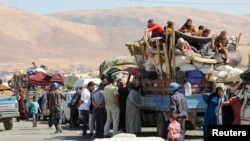The United Nations says 44 peacekeepers taken from their post on the Syria-Israel border a day earlier were removed "for their own protection."
The U.N. said Friday it has received assurances from credible sources that the peacekeepers are "safe and in good health" and that "the intention behind those holding the peacekeepers was to remove them from an active battlefield."
The name of the group holding the soldiers has not been released.
Earlier media reports indicated involvement by the al-Qaida-linked al-Nusra Front.
The international organization has not made direct contact with the soldiers, who are nationals of Fiji serving on the U.N.'s Disengagement Observer Force [UNDOF] in the Golan Heights.
The U.N. also said Friday that 72 Philippine peacekeepers who were confined to their two camps by an unnamed group on Thursday are unharmed.
The Philippine government announced last week its 331 troops in the Golan Heights would be removed at the end of their tour of duty in October, amid worsening security conditions.
UNDOF has patrolled the disputed area since 1974.
Surge of refugees
More than three years of civil war in Syria has forced three million people to flee their homeland, and the fighting is only intensifying, the U.N. refugee agency said Friday.
The United Nations High Commission on Refugees said the flight from Syria has created the world's largest population of refugees under that U.N. agency's care.
The Syrian crisis is ”the biggest humanitarian emergency of our era,” the agency said.
Speaking in Geneva, UNHCR spokeswoman Melissa Fleming said refugees fleeing to neighboring countries are arriving exhausted, frightened and broke. Most people have been on the run for a year or more - taking shelter in one village after another until they driven to leave the country entirely.
There are also worrying signs that escaping Syria is becoming more difficult for refugees, with many being forced to bribe armed soldiers at makeshift border checkpoints.
"And many have to resort to transport using smugglers in order to get out - is becoming very steep," she said. "It may not sound like a lot: around $100 per person, in many cases more. But for Syrians now who have had no work for many years, this is absolutely, hugely expensive.”
The vast majority of refugees are in Lebanon, Jordan and Turkey, and their numbers are straining those nations' economies. A recent UNHCR survey found more than four in five Syrian emigres living outside refugee camps, struggling to make a living in towns and cities. More than a third live in sub-standard shelters.
Lebanon continues to keep its borders open; Jordan and Turkey screen Syrian refugees before admitting them, because of security concerns.
Iraq's central government, meanwhile, has lost control of a large portion of its territory to militants from the Islamic State group and other extremists, so its border is now closed to Syrian refugees. More than a third of Iraq, including Anbar province, is now in the hands of extremist forces, the U.N. estimated.
She also said about 300 Syrians are actually returning to Syria every day, due to the Iraqi violence.
"So this gives you a picture of the situation. When you actually decide to return to Syria - or to flee to Syria, as some Iraqis have - things must be pretty bad in Iraq," she said.
The United Nations estimates nearly 200,000 people have been killed since the Syrian conflict began in March 2011.
Information from The Associated Press and Reuters was used in this report.


